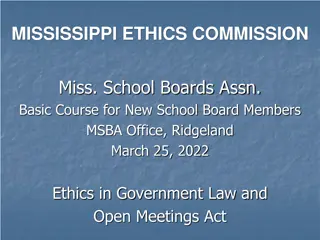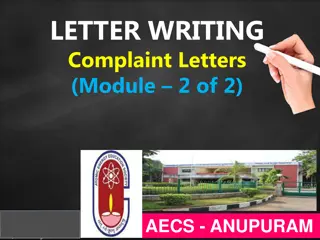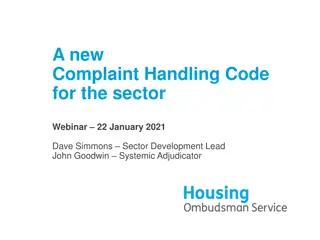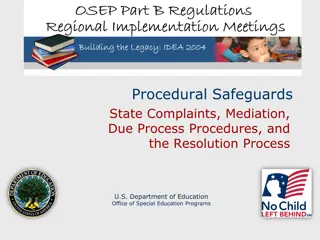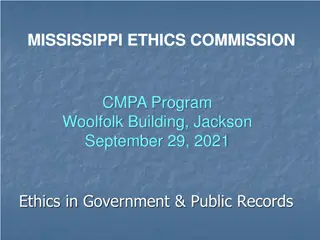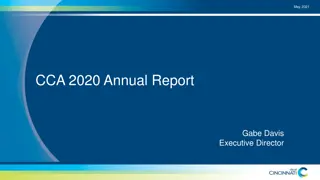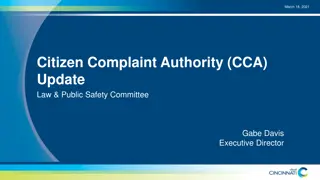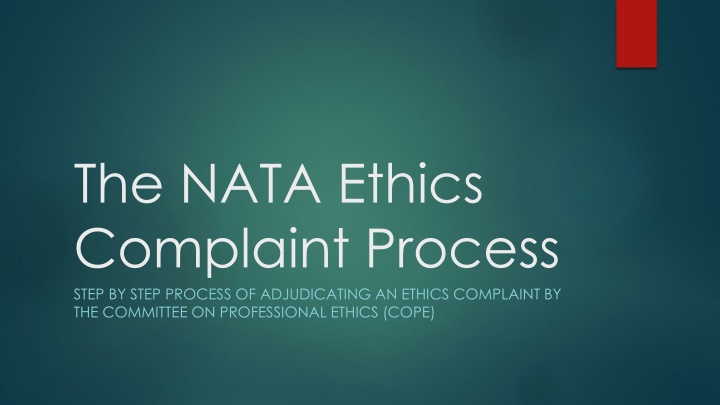
Adjudicating an Ethics Complaint: NATA Committee on Professional Ethics Process
Learn about the step-by-step process of adjudicating an ethics complaint by the NATA Committee on Professional Ethics (COPE), from the initial complaint submission to potential sanctions and the right to appeal. Understand the thorough investigation conducted by the Judicial Panel (JP) and the possible outcomes of the process.
Download Presentation

Please find below an Image/Link to download the presentation.
The content on the website is provided AS IS for your information and personal use only. It may not be sold, licensed, or shared on other websites without obtaining consent from the author. If you encounter any issues during the download, it is possible that the publisher has removed the file from their server.
You are allowed to download the files provided on this website for personal or commercial use, subject to the condition that they are used lawfully. All files are the property of their respective owners.
The content on the website is provided AS IS for your information and personal use only. It may not be sold, licensed, or shared on other websites without obtaining consent from the author.
E N D
Presentation Transcript
The NATA Ethics Complaint Process STEP BY STEP PROCESS OF ADJUDICATING AN ETHICS COMPLAINT BY THE COMMITTEE ON PROFESSIONAL ETHICS (COPE)
The complaint process is initiated when a ethics complaint is received by the NATA office through the online ethics complaint form OR based upon media report or other publicly available sources. Complaint is sent to the COPE chair, who will determine if the complaint warrants a Preliminary Review Panel (PRP) assignment. If no, the case is closed If yes, two COPE members are assigned to the PRP by the Chair. * The PRPs responsibility is the review the information provided in the ethics complaint or media report and decide IF the allegations were true, would it be a violation of the NATA Code of Ethics?
The PRP communicates their findings back to the Chair: If the PRP decision is no, Chair closes case. If the PRP decision is YES, the Chair will notify the Respondent (member) through certified letter, and assign three COPE members to the Judicial Panel (JP). *The JP s responsibility is to conduct a thorough and fair investigation of the allegations. The investigation may include: - Collection of additional evidence (ex: police reports, court documents, etc.) - Interviewing of individuals with personal knowledge - Interview the complainant - Interview the respondent - May consult with NATA legal counsel if determined to be necessary
The JP will render its findings to the Chair at the conclusion of the investigation. If the preponderance of the evidence establishes that a NATA Code of Ethics Violation exists, the JP will assign appropriate sanctions for the case. If the evidence does NOT establish a Code of Ethics violation, no sanctions are applied. The Chair of COPE communicates the findings to the Respondent (member) via certified letter. The Chair will communicate: The standards violated The facts establishing the violations The imposed sanctions and other relevant and important information like the right to appeal. If the member has NOT been found in violation of the Code of Ethics, they are notified and the case is closed.
Non-renewal of membership Private Reprimand Sanctions can include: Cancellation of membership Suspension of membership Public Censure Denial of Membership
If a violation has been found, the member has the right to an appeal. - A Respondent has 10 days to file an appeal to the decision. - Must file a written appeal that includes the specific grounds for appeal. An Appeals Panel consists of three members made up of a NATA board member, a COPE member and a NATA member at-large. The APs responsibility is to review the case records, and may seek additional data or conduct interviews, then issue a ruling. The decision of the AP is final and binding.
It is the NATAs discretion to notify appropriate state regulatory agencies and/or the Board of Certification, Inc., in cases where sanctions have been levied against a member. There are 20 members of COPE: one voting member and one at-large member from each district. COPE members are never assigned cases in their own district. Each case is confidential (unless required otherwise by law).




